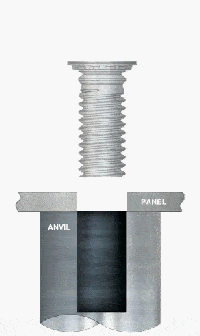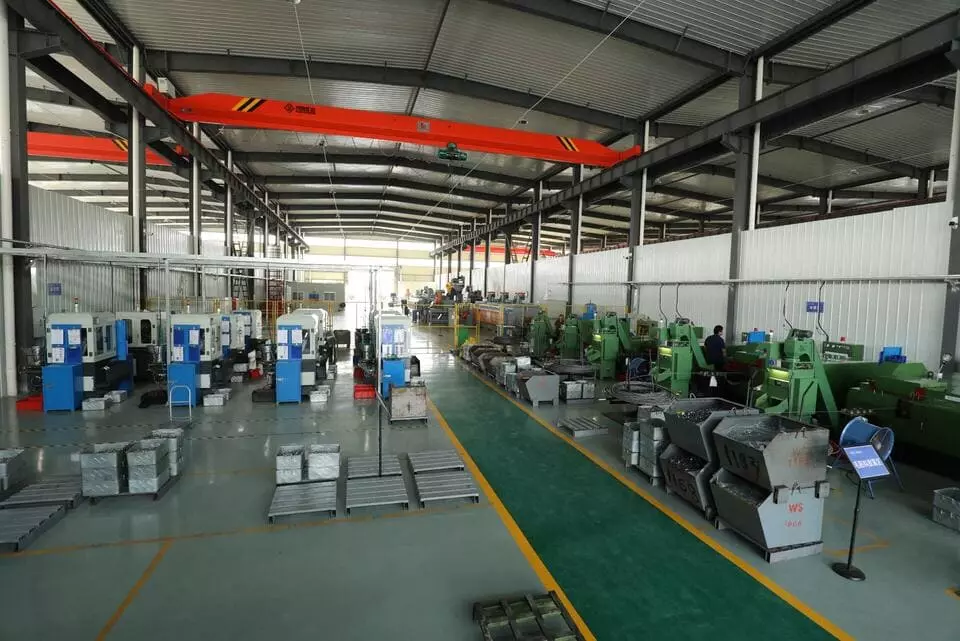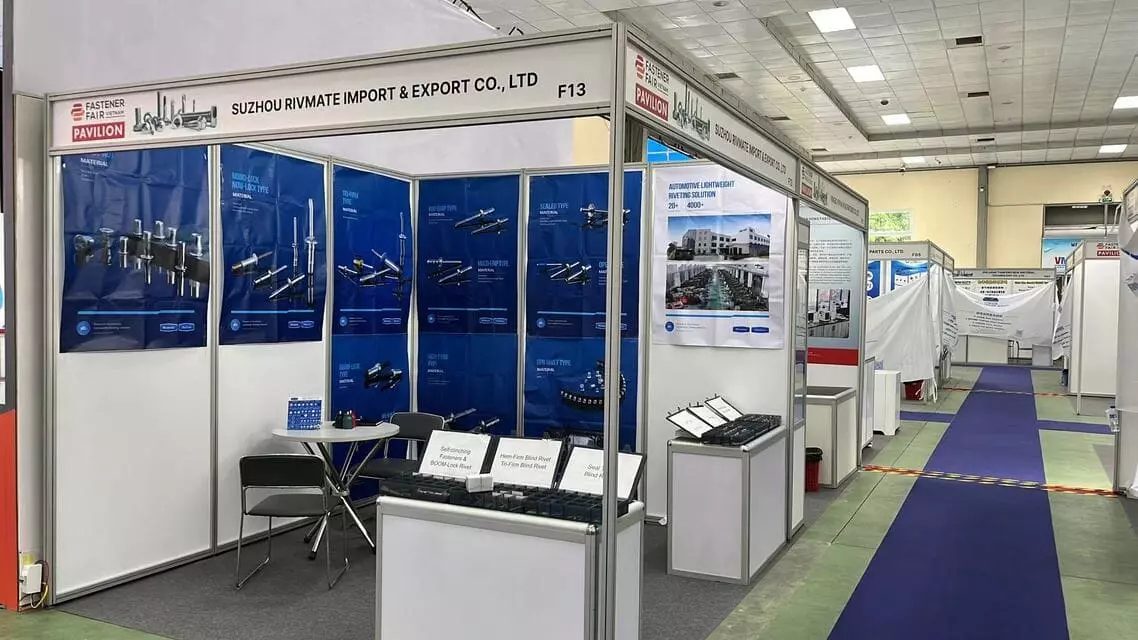Buy Stainless Steel Self Clinching Studs in Bulk
-Bulk stainless steel self clinching studs supply
Engineered for high-strength fastening demands, these studs utilize premium 304/316 stainless steel for superior corrosion resistance, tensile strength, and durability in harsh industrial environments (e.g., marine, chemical, outdoor equipment). Featuring welding-free cold-forming technology, they enable rapid, low-cost installation without thermal distortion. Standardized threads (M2.5-M8) ensure compatibility with automated systems, while custom sizing and surface treatments are available.
Order in bulk to unlock unmatched cost-efficiency, durability, and streamlined workflows.
Home » 10-32 m5 m8 Stainless Steel Self Clinching Studs Wholesale

Why Choose Stainless Steel
- Superior Corrosion Resistance: Medical/food-grade 316L stainless steel withstands acids, alkalis, seawater, and high-humidity environments.
- High-Temperature Endurance: Continuous operating range 196°C to +400°C (short-term up to 550°C).
- Hygienic Compliance: Electropolished non-porous surface meets food/medical contact standards (FDA, EHEDG).
Technical Specifications
- Material & Finishing:
- Material: 304 (1.4301)/316 (1.4401)/316L (1.4404) stainless steel.
- Surface Treatments:Passivation: Enhanced chromium oxide layer; ASTM A967 salt spray test ≥96 hours (zero corrosion).Electropolishing: Achieves Ra ≤0.4μm mirror finish; compliant with Cleanroom Class 100 (ISO 14644-1).
- Sizing Ranges:
- Metric: M2.5–M8 (thread length 4–25mm).
- Unified: #2-56 to #5/16-18.
- Compatible Sheet Thickness: 0.8–4mm stainless steel/aluminum (aluminum requires anodized insulating washers).
- Certifications: ISO 9001:2015, IATF 16949:2016.


Use Stainless Steel Self Clinching Studs to Work Smarter
- Unmatched Corrosion Resistance: 316L-grade chloride/sulfide resistance triples service life vs. 304-grade, ideal for offshore rigs and chemical pipelines.
- Sanitary Design: Electropolished surface inhibits bacterial growth; USP <800> compliant for sterile lab equipment.
- Extreme-Temperature Stability: Maintains thread integrity under cryogenic (liquid nitrogen) or high-heat (thermal processing) conditions.
- Welding-Free Installation: Cold-forming process eliminates toxic fumes (OSHA-compliant) and reduces rework costs by 40%.

Custom Stainless Steel Self Clinching Studs for Medical Equipment Assembly
Used for securing sensors and panels in sterilization chambers and MRI machines, ensuring non-porous surfaces meet FDA-grade hygiene requirements.

Custom Stainless Steel Self Clinching Studs for Food Processing Machinery
Ideal for attaching components in high-pressure washdown environments (e.g., mixers, conveyor belts), resisting acidic cleaners and preventing bacterial buildup.

Custom Stainless Steel Self Clinching Studs for Automotive Electronics
Secures PCB housings and dashboard modules in vehicles, retaining grip under vibration (ASTM B117-tested for salt spray resistance).

Custom Stainless Steel Self Clinching Studs for Aerospace Control Systems
Embeds into aluminum alloy panels for avionics mounting, maintaining torque stability at -70°C to 250°C (MIL-SPEC compliant).

Custom Stainless Steel Self Clinching Studs for Railway Electrical Enclosures
Provides corrosion-free fastening for junction boxes in high-humidity metro systems, with 25+ year lifespan in coastal climates.

Custom Stainless Steel Self Clinching Studs for 5G/Telecom Rack Mounting
Enables tool-free installation of heatsinks and RF shields in base stations, combining EMI shielding with heat dissipation up to 400°C.
How to Install Stainless Steel Self Clinching Studs
Tool Preparation
- Clinching Tool: Pneumatic/hydraulic press (5–10 ton capacity, adjustable stroke recommended);
- Die: Flat-bottom die matching the stud flange diameter (with guide pin alignment hole);
- Backup: Base block with a through-hole tightly fitted to the threaded end (hole tolerance ±0.05mm).
Installation Steps
- Sheet Preparation
- Clean installation area to remove oil residue or burrs. For stainless steel sheets, pre-punch holes (hole diameter = nominal thread diameter ×0.8–0.9).
- Mandatory for aluminum sheets: Use anodized insulating washer to prevent galvanic corrosion.
- Alignment & Clamping
- Secure the sheet on the press table. Align the stud vertically using guide pins (perpendicularity error ≤0.5°).
- Press Parameter Setup
- Adjust force based on sheet material/thickness: Force (tons) = Sheet Thickness (mm) ×3.5.
- Control insertion speed to 15–25mm/s until full flange embedding (cold-flow deformation achieved).
- Quality Inspection
- Visual check: Ensure flange edge is flush with the sheet surface (recession ≤0.1mm).
- Torque sampling test: Apply 1.5x nominal torque to a mounted nut (no loosening or sheet deformation within 30 seconds).

Critical Notes
- Annealing: Pre-local-anneal cold-rolled stainless steel sheets (e.g., 304-H) at 300°C for 30 mins to avoid brittle fractures.
- Anti-Scratch: Apply PTFE coating on die contact surfaces to prevent sheet surface marring.
- Prohibited Scenarios: Organic-coated sheets (e.g., powder-coated aluminum) require thermal stripping prior to installation; coatings reduce clinching strength.
- Pull-Out Threshold: Per ASME B18.6.9, M6 studs in 2mm 304 sheets ≥1800N.
Post-installation 24-hour salt spray test (per ASTM B117) is recommended to verify corrosion-resistant sealing.
Stainless Steel vs. Carbon Steel Self Clinching Studs
| Metric | Stainless Steel Self-Clinching Studs | Galvanized Carbon Steel Studs |
| Salt Spray Resistance | ⭐⭐⭐⭐⭐ (5000h+) | ⭐⭐ (240h) |
| High-Temperature Stability | ⭐⭐⭐⭐⭐ (400°C) | ⭐ (180°C coating failure) |
| Cleanliness Compliance | ⭐⭐⭐⭐⭐ | ⭐ (Coating loss, contamination risk) |
| Initial Cost | ⭐⭐ | ⭐⭐⭐⭐⭐ |
| Total Cost of Ownership | ⭐⭐⭐⭐ (Low maintenance) | ⭐⭐ (High replacement frequency) |
1. Corrosion Resistance & Surface Treatment
- Stainless Steel (304/316/316L):
- Naturally corrosion-resistant; withstands water, salt spray, acids/alkalis without coating (≥720 hours in ASTM B117 salt spray testing).
- Ideal for: Food processing, medical devices, marine hardware, chemical pipelines.
- Carbon Steel (SAE 1018/1022):
- Requires zinc/nickel plating for rust prevention (salt spray resistance: 96–240 hours).
- Weakness: Prone to rusting if the coating is damaged; unsuited for humid/chemical environments.
2. Strength & Load Capacity
- Tensile Strength:
- Carbon Steel (untreated): 500–700 MPa, outperforms stainless steel (304: ~520 MPa; 316L: ~485 MPa).
- Preferred in: Automotive chassis, heavy machinery (non-corrosive environments).
- Fatigue Life:
- Stainless steel offers higher fatigue life (316L withstands 2-3x more cyclic load cycles than zinc-plated carbon steel).
3. Temperature Tolerance
- High Heat:
- Stainless steel: Stable up to 400°C (short-term 550°C); carbon steel coatings degrade above 250°C.
- Applications: Turbine housings, boiler connections.
- Low Temperatures:
- Stainless steel (austenitic grades) remains ductile at 196°C; carbon steel requires special heat treatment to avoid brittleness.
4. Cost & Processing
- Material Cost: Stainless steel (304) is 3–4x pricier than carbon steel; 316L costs 4–6x more.
- Manufacturing:
- Stainless steel wears molds 30% faster due to hardness; requires +15% press force for clinching.
- Weight: Stainless steel density (8.0 g/cm³) limits lightweight designs vs. carbon steel (7.8 g/cm³).
5. Compliance Standards
- Stainless Steel: Meets FDA, EHEDG (food-grade), and USP <800> (medical).
- Carbon Steel: Limited to general industrial use (e.g., ISO 898-1); unsuitable for sterile/biocontact applications.
Selection Guidelines
- Choose Stainless Steel for: Corrosive environments, hygiene-critical zones, extreme temperatures, or low-maintenance requirements.
- Choose Carbon Steel for: Dry/static conditions, short-term cost reduction, or high strength-to-weight ratios in non-critical uses.
- Hybrid Option: Nickel-plated carbon steel balances mild corrosion resistance with cost savings (e.g., indoor machinery).
Have more questions?
Contact us for technical support, advice and quotes.
FAQs
Q1: How do I choose between 304 and 316/316L stainless steel studs?
A1: 304 offers general corrosion resistance for industrial use (e.g., electronics, machinery). 316/316L is required for extreme environments (saltwater, chemicals, medical/food-grade) due to added molybdenum, enhancing pitting and chloride resistance.
Q2: Can these studs be installed in aluminum sheets?
A2: Yes, but use anodized insulating washers to prevent galvanic corrosion. Maximum recommended aluminum thickness: 4mm (adjust clinching force to 10–15% lower vs. stainless steel sheets).
Q3: What prevents stainless steel studs from loosening under vibration?
A3: The cold-forming process creates a zero-clearance metal-to-metal grip, while 316L’s fatigue resistance outperforms carbon steel by 3x (tested to ISO 16130 vibration standards).
Q4: Are they suitable for high-temperature applications?
A4: Yes. 316L withstands -196°C to +400°C continuously (short-term 550°C), ideal for exhaust systems or cryogenic equipment. Avoid carbon steel above 250°C (coating degradation).
Q5: How do stainless steel studs compare in cost vs. alternatives?
A5: Initial cost is 3–6x higher than carbon steel, but lower lifetime costs due to zero coating maintenance, no corrosion replacements, and compliance with stringent industry standards.
Buy Self-Clinching Studs in Bulk from Rivetfix

At Rivetfix, we offer competitive pricing for bulk orders, making it easier for businesses to stock up on the fasteners they need without compromising on quality. With fast delivery times and exceptional customer support, we ensure that you receive the right product for your requirements, every time. Trust Rivetfix to provide you with the best self-clinching studs in bulk, backed by industry expertise and a commitment to customer satisfaction.
Packaging & Delivery
At Rivetfix, we offer a variety of packaging options to meet different customer needs:
- Bulk Packaging: Suitable for large orders, products are packed in bulk for efficient storage and transportation.
- Custom Packaging: We provide customized packaging services according to customer requirements, including personalized packaging design, labeling, and box dimensions, ensuring product safety and brand consistency.
Delivery Time: Depending on order quantity and production schedule, the standard delivery time is within one month. We also offer expedited delivery services for urgent customer needs.
MOQ: 50000
Rivetfix, as part of Rivmate, can also supply high quality rivets and riveted parts. If you have a requirement, please contact us!

